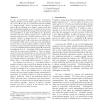Free Online Productivity Tools
i2Speak
i2Symbol
i2OCR
iTex2Img
iWeb2Print
iWeb2Shot
i2Type
iPdf2Split
iPdf2Merge
i2Bopomofo
i2Arabic
i2Style
i2Image
i2PDF
iLatex2Rtf
Sci2ools
SODA
2008
ACM
2008
ACM
Unconditionally reliable message transmission in directed networks
In the unconditionally reliable message transmission (URMT) problem, two non-faulty players, the sender S and the receiver R are part of a synchronous network modeled as a directed graph. S has a message that he wishes to send to R; the challenge is to design a protocol such that after exchanging messages as per the protocol, the receiver R should correctly obtain S's message with arbitrarily small error probability , in spite of the influence of a Byzantine adversary that may actively corrupt up to t nodes in the network (we denote such a URMT protocol as (t, (1 - ))reliable). While it is known that (2t + 1) vertex disjoint directed paths from S to R are necessary and sufficient for (t, 1)-reliable URMT (that is with zero error probability), we prove that a strictly weaker condition, which we define and denote as (2t, t)-special-connectivity, together with just (t+1) vertex disjoint directed paths from S to R, is necessary and sufficient for (t, (1 - ))-reliable URMT with arbitr...
| Added | 30 Oct 2010 |
| Updated | 30 Oct 2010 |
| Type | Conference |
| Year | 2008 |
| Where | SODA |
| Authors | Bhavani Shankar, Prasant Gopal, Kannan Srinathan, C. Pandu Rangan |
Comments (0)

